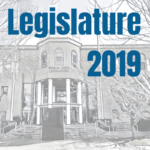By Richard Karpel
In my short tenure with NPA, I haven’t heard any members complain about how government agencies implement the Open Meeting Law (Nevada Revised Statutes Chapter 241). Moreover, I attended two meetings of the OML Task Force and found the government representatives who also attended the meetings to generally respect the aims of the statute and to be fairly reasonable in their requests for changes.
It’s a completely different story when it comes to the Public Records Act (NRS Chapter 239). Many NPA members have voiced frustration with how difficult it is to get some state agencies to comply with legitimate record requests. Even requests that are clearly sanctioned by the PRA are often denied.
 Why is the culture surrounding the implementation of the two laws so different? There are probably a number of different factors, but one stands out: There are consequences for government officials and public bodies that fail to comply with the Open Meeting Law, including misdemeanor penalties for willful violations. There are none for those who violate the Public Records Act.
Why is the culture surrounding the implementation of the two laws so different? There are probably a number of different factors, but one stands out: There are consequences for government officials and public bodies that fail to comply with the Open Meeting Law, including misdemeanor penalties for willful violations. There are none for those who violate the Public Records Act.Our highest priority this session is to change that. That’s why NPA joined Right to Know Nevada, a broad coalition supporting Senate Bill 287, sponsored by Senator David Parks. The bill, which is scheduled for a hearing before Parks’ Government Affairs Committee this Wednesday, would establish civil penalties for government officials who violate the PRA.
Under current law, the sole remedy for members of the public who are stiff-armed when they make a records request is to file a lawsuit. Only large corporations and the wealthiest Nevada citizens can afford to do that, adding another layer to a two-tier system of governance. And when government agencies lose and are forced to pay the requester’s attorney fees, it is taxpayers who are forced to foot the bill, not the public officials who decided to withhold the records. In other words, public officials have no incentive to comply with the law, as they face no penalty whatsoever for deliberate lawbreaking.
SB287 would change that by potentially subjecting them to civil penalties of between $1,000 and $250,000 per offense.
Among other provisions, the bill would also:
- Clarify the meaning of “public record”
- Limit agencies’ ability to charge excessive fees for records requests
- Require agencies to respond to requests “promptly” and to assist requesters to focus their requests to “maximize the likelihood” they will get access to the information they are looking for, and
- Require agencies to provide records in an “electronic format” unless it “was requested in a different medium.”
Another excellent public records bill is scheduled to be heard the following morning (Thursday, April 4 at 8:30 a.m.) in the Assembly Government Affairs Committee. Assemblyman Skip Daly’s Assembly Bill 371 would eliminate the “balancing test” government agencies presently apply to determine whether a record is public or confidential, and would allow records requests to be denied only when a specific exemption or exception is “provided by statute or regulation”.
Many government agencies search for the flimsiest of reasons to withhold public information. AB371 would shut down one of their richest sources of opportunity.
 Nevada Press Association The best in Nevada journalism since 1924
Nevada Press Association The best in Nevada journalism since 1924
